Billing audits aren’t just for large hospitals or high-risk specialties — they can happen to any healthcare provider, including outpatient clinics, behavioral health programs, and solo practices. Whether it’s a payer-led review, a Medicaid compliance check, or a response to a denied claim, your ability to pass an audit depends on one thing: billing audit readiness.
We help practices stay organized, compliant, and ready, so audits don’t turn into liabilities.
⚠️ Why Billing Audits Happen
Insurance payers, government programs (like Medicaid), and clearinghouses may initiate audits when they see red flags such as:
-
Increased claim volume
-
Repetitive coding patterns
-
High usage of high-reimbursement codes
-
Claims without supporting documentation
-
Past denials or appeal histories
-
Delayed or excessive resubmissions
📌 Whether you’re targeted for cause or part of a random review, preparation is key.
📋 Billing Audit Readiness And What Billing Auditors Look For
Across specialties, audit teams typically check for:
✅ 1. Proper Documentation
-
Detailed session or visit notes
-
CPT/HCPCS codes that match services provided
-
Signed provider documentation
-
Supporting documentation for time-based billing
✅ 2. Authorization & Eligibility Records
-
Proof of active insurance coverage
-
Prior authorizations for covered services
-
Notes showing services occurred within authorized timeframes
✅ 3. Accurate Coding & Modifiers
-
No upcoding or unbundling
-
Correct use of modifiers (e.g., -25, -59, -GT, -95)
-
Documentation that matches code level (especially for E/M or therapy sessions)
✅ 4. Compliance with Timely Filing
-
Submissions made within each payer’s filing window
-
Records showing the date of service match the date of submission
✅ 5. Provider Credentials
-
Proper credentials for billed services (e.g., RBT, LCSW, MD)
-
Current NPI and licensing records
-
Active enrollment with payer networks
🧠 Signs Your Practice May Not Be Audit-Ready
-
You’re unsure how long you must keep billing records
-
Providers don’t document sessions immediately
-
There’s no internal billing SOP
-
You rely on one person for all billing and coding
-
Denials are increasing, but you’re not sure why
-
There’s no system to track authorizations or treatment plan expirations
Sound familiar? That’s where we come in.
🛠️ Proactive Steps to Ensure Billing Audit Readiness
Here’s how to boost your billing audit readiness starting today:
-
Standardize Documentation
Use templates and checklists to ensure every visit/note includes the right info. -
Audit Your Claims Internally
Sample 5–10 random claims/month. Check coding, notes, and authorizations. -
Stay Current on Payer Policies
Know the rules for your top 5 payers — and review updates quarterly. -
Train Your Staff
Ensure everyone (clinical + billing) understands what’s required for clean claims. -
Create a Billing SOP Manual
This sets a standard for how claims are submitted, corrected, and tracked.
🤝 Our Billing Audit Readiness Keeps You Audit-Ready
Whether you’re an ABA clinic, mental health provider, or multidisciplinary group, we help you prevent problems before they start.
We provide:
-
Monthly or quarterly chart audits
-
Documentation reviews and feedback
-
SOP creation and staff training
-
Claim scrubbers to catch issues before submission
-
Denial tracking and appeal support
-
Full-service billing and AR management
📞 Call us today at 844-TAYLOR-9 (844-829-5679)
🌐 Message us online
📧 Send us an email


